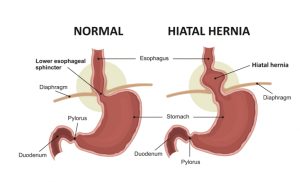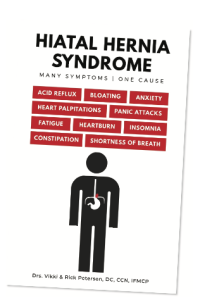Can a Small Hiatal Hernia Cause Much Pain? – Video
Can a Small Hiatal Hernia Cause Much Pain?
What you will learn about
Hiatal Hernias are interesting in that larger hernias don’t necessarily cause more intense symptoms. Factually, small hiatal hernias can still cause misery with everything from shortness of breath, acid reflux, heart palpitations, panic attacks, and more. In this video, Dr. Vikki explain why a small hiatal hernia can result in miserable symptoms.
Transcript of the video
By Dr. Vikki Petersen
A subscriber to my channel asked a great question yesterday. He said: I have a small hiatal hernia, one-centimeter wide, why do I have all these symptoms?
What is one centimeter (for those of us in the United States who grew up not with metric)? It is four-tenths of an inch. A little less than half an inch… not very large.

What happens is the size is just how much the opening has gotten distended by the stomach, pushing up. But you can have a sliding hiatal hernia which goes up and it comes back down. You can have a very small hiatal hernia of just less than half an inch of expanded opening. And that is enough. Why? Because it’s the manifestation of what occurs with anatomy doing the wrong thing. So the stomach is in spasm and it’s pushing up on the diaphragm. Now the poor diaphragm can’t freely move. So you get that shortness of breath; you can get feelings of anxiety; trouble sleeping at night because you’re horizontal at night so gravity is not doing you any good to help pull the diaphragm down and make it a little easier for it to move.
It gets worse when you’re horizontal, is what I’m trying to say. Then what happens is the stomach is just below the diaphragm on the left side, and the heart is just above the diaphragm on the left side. So geographically, they’re very close to one another, and as soon as that stomach is — well, they thought you have a small hiatal hernia, it means it’s pushing up — it’s jammed up against that diaphragm. Now it’s really close to the heart and it can literally influence how the heart is functioning.
And you can get these extra beats or heart palpitations where you’re actually feeling your heart. Unless you’re working out really hard, you’re not supposed to feel your heart. And with that, of course, we can get stressed… But even without the heart palpitations, what can happen is because the diaphragm is not moving freely and you’re feeling a little short of breath, you can’t take a deep breath. Then your stress hormones really start to multiply. And your body is trying to help you. It’s kind of like why we have fire alarms in our homes. It’s to help us, right? It’s a smoke alarm. It’s to get you up and out before it gets to be such a big fire and you can’t get out.
Similarly, your body’s nervous system is very clued into how much oxygen you’re getting. So as soon as that diaphragm is a bit spasmed and not freely moving, your body’s stress hormones say “Hey, I don’t know what’s going on, but pay attention, right?” And that elevated voice translates into “you are just on high alert”.
Your heart is pounding a little fast. You feel nervous, you feel anxious, and you look around your environment and you go, “I don’t know why I feel this way”. There’s nothing bad happening [around you] but internally there is. And your nervous system is trying to help you out by saying, “do something”. Now, it’s not fun to have a panic attack for shorts. Very, very, very scary. But when you get past the acute part of it and you get to the reason why, when you get to the root cause of why, it’s very interesting how your body is trying to protect you.
So it’s not about coming back to the size of our hiatal hernia. It’s not about how large it is, it’s just the fact that it is. You see, it’s just that it is. Your stomach is geographically in the wrong place. It’s pushing on your diaphragm; it’s bothering your heart.

And predominantly, it’s coming from mal-digestion, mal-absorption. You’ve got bloating, maybe you’ve got diarrhea or constipation. Constipation’s a bit more common. You can have a combination of both. These are all the things we look at.
Again, that’s the reason — and I’m answering the question asked by this person [about his small hiatal hernia], but I know other people have this question or their whole problem gets negated by traditional medicine that tells them, “Listen, okay, you do have a small hiatal hernia. It’s so darn small, there’s no way this is causing your problems. You’re having panic attacks because you’re under stress”… And they just go with “it’s up here”. Which is not fair, it’s not fair to you.
So this has become an area that we’ve become very expert in over the years. I wrote the book a couple of years ago, the Hiatal Hernia Syndrome. The number of people suffering of all ages, both sexes, has nothing to do with young, old, in shape, out of shape,…It’s not that. It’s not that.
We evaluate it from a physical standpoint, hormonal standpoint, structural component of it. That’s very, very key to not miss. And we can actually do it over telemedicine and, we’ll show you how that can be in some future videos.
If you know anybody who’s suffering, even if you’ve been told, “you have a very small hiatal hernia” or they couldn’t even find it — remember, sliding up, down, up, down, so if it happens to be down when they do the endoscopy, they won’t see it. Okay? They don’t necessarily see that widened opening. Or in my book I named a new version of hiatal hernia syndrome, which is subclinical and it means the opening hasn’t opened wider, but that poor stomach is jammed up against that diaphragm creating this whole cascade of symptoms. The symptoms can be very debilitating with a very small hiatal hernia or even no expanded opening, just that subclinical situation which I just described.

My new book Hiatal Hernia Syndrome offers much more detailed information on the syndrome: its symptoms, its causes, how it can be remedied. You can click on the link and the picture to find it on Amazon.
Additional resources:
Sliding Hiatal Hernia: Do You Suffer From It?
Suffering from Hiatal Hernia Stopped: A patient’s personal story
Hiatal Hernia Surgery: Just 1 option, Not Always Right
About Root Cause Medical Clinic in Clearwater, FL
Our medical clinic offers the knowledge and efficiency of a pluri-disciplinary medical team, and a deep expertise in internal medicine, functional medicine, chiropractic care, nutrition and physical therapy. We adopt the Root Cause Medicine model: instead of treating symptoms to produce a short-lived relief, we analyze your current health situation and focus on tracing back the disease to its root cause. Our doctors work as a team to create a personal treatment that addresses the root cause and allows your body to heal properly. Visit our clinic, meet our doctors. We are located at the corner of S Ft Harrison Ave. and Magnolia Dr. in downtown Clearwater. Our building a parking lot, so parking is not an issue.

